- Home
- Jill Eileen Smith
The Desert Princess Page 3
The Desert Princess Read online
Page 3
“What kind of riddles?” My curiosity was piqued. I loved games.
“Word riddles. Things most people don’t think about.”
I smiled. “I like riddles.”
His dark eyes lit in pleasure. “I will give you one now to think on as you travel. Then when you arrive home, you can write the answer and send it to me. Hopefully the messenger will deliver it quickly.” He leaned in close. “Are you ready?”
I laughed, giddy with our shared secret. “I’m ready.”
He straightened, looking every bit the prince that he was. “What is like vinegar to the teeth and smoke to the eyes?”
I studied him and rolled the words over in my mind. “What is like vinegar to the teeth”—I pursed my lips at the sour word—“and smoke to the eyes?” I squinted for effect.
He nodded. “Do you know?”
I thought a moment, then shook my head. “I will need to think on it.”
He smiled. “Good.”
Voices drew near, and a sinking feeling settled in my middle as my father approached and bid Solomon farewell. I glanced back at Solomon as the donkeys moved forward. He stood now with his father, a king and his heir apparent, and I prayed that Solomon’s God would spare him the war that was coming.
Interlude
Five years seemed like an eternity in my youth. If I could have sped the shadows of the sundial or advanced my life to adulthood, I would have. I suppose I carried the burden of loss too close to my heart in those days. Loss of my mother, of Padi, but most especially of my friendship with Solomon. His letters had been few, but those that had come became my treasures, and I continued to wrap my emotions around his memory.
I had hoped, foolishly so, that Solomon would travel to visit me, perhaps as his father’s ambassador. I should have known—given our history, and how my uncle Hanun had humiliated King David’s ambassadors years before I was born—that the king would not trust us to treat his favored son with honor. For despite my father’s good relationship with Israel, our nation had remained their vassal ever since. Solomon would have no need to visit a lowly vassal state.
But still, because he told me more than once that he wished to come, I held out hope that he would do so, that our friendship would be reignited and he would love me, as I had dreamed so often he would.
Eventually I realized that wishes are vapors. If I wanted to see Solomon, it would be up to me to find a way.
4
RABBAH, 975 BC
The sounds of clashing wooden swords greeted me as I walked along the stone bridge overlooking the military courtyard and pulled myself up onto the ledge to peek over the tall parapet. Ba’sa, my dear Padi’s oldest brother, grunted and growled at one of the captains, whose barely hidden smirk told me the man thought my arrogant cousin’s skill humorous. Ba’sa was heir apparent to Uncle Hanun’s deposed throne, but no one in the kingdom really took him seriously.
My arms grew weary of holding me aloft on the ledge, and I jumped to the ground, suddenly not interested in Ba’sa’s lack of skill. The sun had risen nearly halfway to the sky, and I tilted my head to allow its kiss on my cheek. I loved the sunshine and the warmth it gave. Warmth too often missing from my heart these days.
Footsteps behind me drew my attention. I turned gracefully, just as my palace tutors had taught me every day of my fifteen years. Jabbar stopped when he stood but a few steps from me and offered me his lazy smile.
“Come to watch my brother be humiliated once again?” Jabbar’s smile brought an almost handsome quality to his square face. “I could beat Ba’sa with one hand behind my back.”
“And I see you have no problem making me aware of that fact.” I crossed my arms. “Perhaps you should take on one of the captains and prove your worth to me.”
My father had often hinted his intention that Jabbar and I should one day wed. I did not agree and had put him off whenever he thought to mention it. I didn’t want Jabbar. Jabbar worshiped at the temples of Molech, and I no longer believed in Molech, though I hid my faith from all but Inaya. I suppose I feared the repercussions. Not even Abba knew my heart’s secrets.
But Solomon had shown me a better faith in his God through the short correspondence we’d had before I grew to be a woman. Why had his missives suddenly stopped? I longed to know what had become of him. Did he think of me still?
The questions burned as I looked into Jabbar’s haughty pale eyes.
“I would prove my worth to you and my skill, Naamah,” Jabbar said, bringing my thoughts back to him, “if you would but say the word and allow our betrothal. You know I would make a good husband. Even your father agrees.” He leaned closer, and I could smell the garlic on his breath from the morning’s repast. “I daresay there is none better than myself in all of Ammon.”
“Pride comes before disgrace, Jabbar.”
“Look who believes she is a wise one.” Jabbar’s haughty laugh made me recoil.
“They are the words of a friend.” They were Solomon’s words, from one of his notes I’d received long ago when messengers had carried our childish correspondence a time or two, tucked among more urgent messages needing my father’s attention. But all that had ceased when I reached marriageable age.
Jabbar took a step back and rested one hand against the parapet, studying me. “You have to marry sometime, Naamah. Who else could you possibly want but me?” He winked at me, but I felt only disgust and none of the appeal that Solomon’s similar expressions had evoked from me in years past.
While I knew better than to hope for the impossible, a stubborn part of me still longed for more than what my country offered, more than what Molech could give me.
I suffered Jabbar a withering glance, wanting him to feel my affront at his assumptions. “You are not the only man in Rabbah, Jabbar.”
“I may not be the only, but you know I am the best for you.” His serious tone made me uncomfortable.
“I do not know that. There are too many things we have not discussed.” I met his gaze and felt the heat creep up my neck at his ardent look. When had this conversation taken such a turn? He was just being spoiled, arrogant Jabbar. He could not truly think I would accept his overtures as anything meaningful.
“Like what? Ask me anything, Naamah. Let us allay your fears and confusion and stop these childish games.”
He settled himself more comfortably against the rail while I shifted from foot to foot. I glanced beyond him toward the gardens. The hall of meeting was a few steps past those gardens, where Abba would be spending most of his day planning yet another trip to Jerusalem. A trip I needed to make with him, to clear my heart’s longing for Solomon once and for all.
I looked back at Jabbar and sighed. “I cannot have this conversation with you right now, Jabbar.” I ran past him and toward Inaya’s gardens.
“You cannot run from me forever, Naamah!” he shouted after me like a whiny child, and I knew he would not stop his pursuit as long as he thought there might be a chance to win me.
But there were many reasons I could not marry this charming, arrogant cousin of mine. Jabbar celebrated in the streets during the sacrifices, and despite the loss of his own brother to Molech’s flames, Jabbar believed the priests’ words that we must continue to appease our god.
But Solomon’s faith had ignited my own. And my mother had taught me, though the memories were dim, of Elohim.
I did not believe in Molech, and I wanted desperately to go to Jerusalem to learn more of Solomon’s God. I could not tell whether it was my longing for faith or love that drove me most.
But I knew in that moment I would find Abba and convince him at last to take me with him to Jerusalem.
Fortunately, Abba took little convincing, and by early the next morning I was sitting atop a colorfully draped camel with Inaya riding another at my side. My nurse did not find the trip one of necessity as I did, but she did not object. I think she secretly hoped to speak again with Bathsheba’s maid, as they had struck a quick kinship during those few d
ays in Mahanaim. And though she did not say so, I suspected that perhaps she favored Prince Solomon a bit too. At least she had not discouraged my talk of him through the years.
“Do you think he will remember me?” I asked Inaya as the caravan left the gates of Rabbah and fell into a graceful, swaying rhythm. “I am no longer a girl of ten.” My heart skipped a beat just thinking about what the man Solomon might be like compared to the boy of my memory.
“If he does not remember you as a child, I am certain he will be glad to become reacquainted with you as a woman, my princess.” Inaya gave me what I knew was meant to be a comforting smile, but her tight grip on the camel’s reins and her grimace gave the impression that she was more concerned with staying aloft than answering questions to please me.
“I hope Solomon and I will have a chance to speak as we once did.” I did not wait for her answer but looked ahead to the distant hills and stretch of barren lands, banked by forests and shrubbery in places where the rivers flowed. It was entirely possible that only King David’s women would greet me and that I would have no contact whatsoever with Solomon. I had no certainty that Solomon would be in the audience chamber or whether he was even in Jerusalem at all. His father could have allowed him to travel to one of the tribal towns in Israel, something Solomon had once said he longed to do. My stomach gave a funny turn at the thought that my trip there might be in vain.
I could feel the tightness of my shoulders and the clenching of my jaw. I drew in a breath, forced myself to relax. If Solomon was in Jerusalem, I would find a way to see him.
The landscape changed from grassy to forest to sparse to lush vegetation and back again over the next few days as we passed Shittim, then crossed the Jordan into Jericho, then wove our way through the hilly terrain, until at last we camped on the outskirts of Jerusalem.
“Why do we not enter Jerusalem’s gates this night, Abba?” My body still swayed with the camel’s lumbering gait, though my feet now touched solid earth. “Would we not be safer within its walls?”
Abba glanced up from the saddlebag he had been foraging through. He pulled tight the leather strings and faced me. “We are well protected, my daughter.” He glanced at my robe, and I followed his gaze. “I thought after such a dusty ride that we would like a night to refresh before we are introduced to the king.” He smiled and patted my cheek. “It is better to see the king—and his family—in the light of day than by the glow of lamps.”
I looked at Abba, caught the hint of a smile in his eyes. He had guessed my real reasons for coming, though I had only told him I needed to get away and reminded him of Bathsheba’s invitation.
“Perhaps you are right.” I kissed his cheek as I turned to my tent, not certain I agreed with him. Still, it would be better for Solomon to see me after a night of rest rather than disheveled from riding for three days.
I slept little that night, though, dreaming often of Solomon, wondering what he might look like. As a boy of twelve he had turned the gazes of many women in his direction. I could only imagine how much more he did so now.
Inaya helped me into fresh clothes the following morning, the ones I had reserved for what I hoped would be the first of several meetings. “Hold still, child. Let me finish.” Inaya laid the colorful soft linen headscarf over my head of dark curls and brought it into a clasp behind my left ear. She held the bronze mirror for me to inspect my appearance.
“Do you think he will find me exotic, Inaya?” I could not help the fluttering of my heart at such a sudden, strong desire to please him.
“He will find you beautiful, my girl.” She touched my cheek and gently tugged my chin up so that my eyes would meet hers. “Show him a woman of confidence. I daresay he will not be able to take his eyes from you.” Her smile showed a gap between her front teeth, one of Inaya’s many physical imperfections. I loved her regardless of them, and I hugged her to show my gratitude.
“There, there, now. No need to muss your clothes for your old nurse.” She pushed me gently away from her and looked me over. “The harder task for you, my girl, will be to convince your father to seek an alliance with King David and Solomon. Marriage into a king’s family is tricky business. Careful planning and your father’s diplomacy will matter more in the end than your beauty. Pray that your father speaks the right words.”
I nodded like a small child learning once again at Inaya’s knee. She was right, of course. I could cast demure glances Solomon’s way, could even engage him in stimulating conversation during a walk alone in the gardens, if I could manage to arrange such a thing with him—and at the moment I had my doubts. But the real hope lay in my father’s ability to convince King David to make the alliance. King David had married a foreigner once, but Maacah was the mother of Absalom, the son who had tried to kill them in that year I first laid eyes on Solomon. King David might not be so willing to give his son to a foreigner now.
“I do not even know whether Solomon will want to marry me, Inaya.” I looked at her, longing to feel her reassurance as I had so many times before when my fears took wing within me. But these fears were not easily fixed by childhood songs and sturdy arms wrapped about me in the night. Inaya could not make this turn out as I prayed it would.
Why did I pray thus? Worry crept into my heart and settled there as though it planned to stay. I shook myself, longing to fling the anxiety away from me as I would a crawling insect or some other annoying pest. But the feeling would not leave.
“Before we fret about a marriage alliance, let us first go with your father and meet the king and this prince you cannot seem to forget. One look at him and you may change your mind completely.” Inaya scrunched her face like she did when she smelled a foul odor.
I laughed. “Perhaps Solomon has grown into an arrogant, pompous man.”
“Like a spoiled prince.” Inaya’s comment sobered me.
“Like Jabbar.” My voice dropped in pitch, and I shook the thought aside. I could not imagine Solomon would become such a man. Please not! “I doubt he is any of those things,” I said, preferring the fluttering stomach and the imaginings I had encouraged through the years.
“I doubt so too, my girl.” Inaya turned from me and started to pack my belongings into the camel bags. “But let us stop our speculations and go. Your father will be tapping his foot in impatience by now.”
The image of Abba’s impatience suddenly fueled my own. I was about to ride through Jerusalem’s limestone gates, down brick streets, to the gleaming golden palace I had only heard about in stories from my father.
I hurried to help Inaya and cast a silent prayer to Solomon’s God that the king and his son would not find me wanting.
5
My camel turned at the bend in the road and carried me through the guarded gate to King David’s palace. I was so taken with the sights, the beauty of the place, that I barely heard my father order the camels to kneel. Sparkling white stone pillars held the roof above a grand porch, and gleaming, golden lion’s-head sculptures were mounted on either side of the great wide doors.
I blinked, trying to clear my thoughts and focus on what the guard was saying to my father, but I could not shake the dazed feeling that filled me. What splendor! The palace in Rabbah was nothing in comparison. The realization made me suddenly aware that I was no match for King David’s son. I could not expect an alliance to be made on my behalf. I was the daughter of a reluctant ambassador and subject of this king, nothing more.
The sobering thought would not abate as I followed the guard to the anteroom several steps behind my father. When at last the guard left us to wait our turn to see the king, I sought my father’s ear.
“I did not think the king quite so wealthy,” I said, keeping my voice low. “They had so little in Mahanaim, and even the stories you told . . . ” Words failed me, and I gave him an imploring look. “I should not have come.”
He gave my arm a reassuring pat. “Of course you should have come,” he said in his soft, comforting tone. “King David came from humble
means, my child. All of this wealth”—he waved a hand over the room rich with tapestries and colorful mosaic tiles in shades of blue and gold and gleaming white—“means little to this king. He is still a humble man, my daughter. You need not fear.” His smile helped but a little to overcome my anxious heart.
“I will try, Abba.” I wanted to say more, but another guard approached. We were ushered into the audience chamber sooner than I expected. A golden throne stood at the end of a long room, and tables and additional seats were placed beneath arched porticos on either side of the hall. Scribes and courtiers stood or sat in these areas, their gazes fixed in our direction. Heat crept up my neck, and I thanked the God of Solomon for the veil that hid my embarrassment.
We stopped at a green and blue line of tiles before the raised dais and bowed low, but before we did, I dared to glance in the king’s direction. Another chair was to his right, and Solomon’s mother sat upon it. I drew in a sharp breath. She was more beautiful than my memory recalled. She smiled at me, and I quickly lowered my gaze. Did this kind woman remember me?
But it was Solomon whose form I longed to set eyes upon, yet I had seen no sign of him, which dampened my spirits. Where could he be? My heart beat faster within me as thoughts tumbled inside my head. Abba was wrong. I should not have come.
“Shobi, my friend. It is so good to see you again.” King David’s voice was strong, and when I glanced up at him, I noted the genuine affection in his eyes. “Is this your little daughter?” The king’s brow lifted and he offered me an approving smile. “Though she is a child no longer.”
My father inclined his head in my direction. “Yes, my lord. This is my Naamah. She was anxious to see Jerusalem, and now that she is a woman grown, I thought the time was right.”
King David glanced at his wife. “You remember Naamah, my love?”
Bathsheba’s smile warmed me as it did the day I met her in Mahanaim. “Yes, of course, my lord.” She smiled at the king, then took my measure. “She has grown into a lovely woman.” She looked at my father. “You must be quite proud of her.”

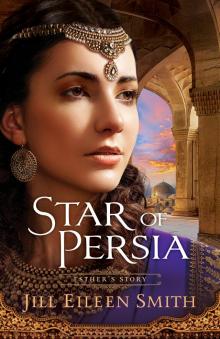 Star of Persia: Esther's Story
Star of Persia: Esther's Story The Shepherdess
The Shepherdess Abigail (The Wives of King David Book #2): A Novel
Abigail (The Wives of King David Book #2): A Novel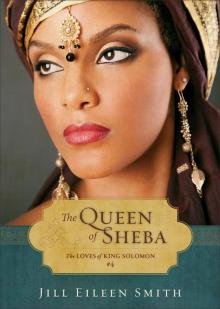 The Queen of Sheba
The Queen of Sheba Michal
Michal Rebekah
Rebekah A Passionate Hope--Hannah's Story
A Passionate Hope--Hannah's Story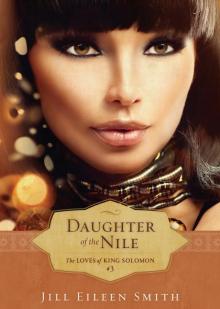 Daughter of the Nile
Daughter of the Nile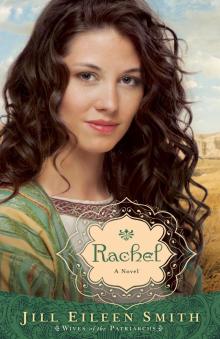 Rachel
Rachel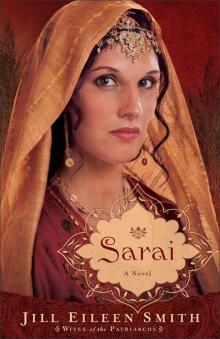 Sarai
Sarai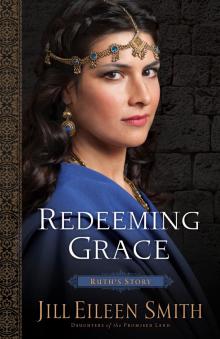 Redeeming Grace: Ruth's Story
Redeeming Grace: Ruth's Story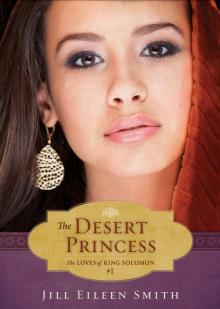 The Desert Princess
The Desert Princess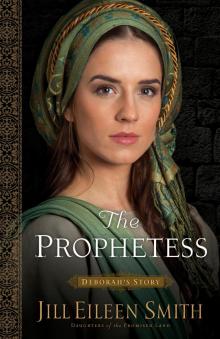 The Prophetess - Deborah's Story
The Prophetess - Deborah's Story